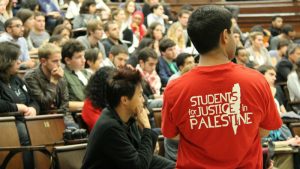The Palestinian people, their fundamental rights, and their aspirations for sovereignty are facing a historic moment of vulnerability. Whilst the root cause of this predicament is the Israeli apartheid regime − which many scholars and experts identify as having emerged from a Zionist settler colonial project that gained traction in the early twentieth century − this vulnerability has been exacerbated by recent global political trends. Right-wing populism is on the rise and is taking hold in powerful states, including the United States, Brazil, and Hungary. Similarly, Israel has just elected its most right-wing government to date, with an election campaign that featured new levels of racism and bigotry. Moreover, in an effort to drum up support days before the election, Benjamin Netanyahu promised to annex the West Bank.
It has never been more important to advocate for Palestine in the international policy world. But Palestinians are at a severe disadvantage. Israel has long been able to violate international law without consequences, largely due to global political interests but also because it has been successful in advocating its main policy narrative, namely, that Israeli “security” trumps fundamental Palestinian rights. This narrative relies heavily on dehumanizing Palestinians, a tactic easily accomplished in a global climate of Islamophobia, one replete with “War on Terror” discourse that puts the safety of the West over the lives of people in the Global South. This has forced Palestinians in their advocacy efforts to focus on the basics, promoting the idea that the Palestinian cause is a just and moral one, arguing that Palestinians are entitled to fundamental rights, and maintaining that those rights must be guaranteed by the international community.
Further, the discourse of the advocacy and policy world has changed over the last twenty years, in part due to the Oslo “peace process” and its transformation of Palestinian civil society and governmental institutions. Oslo imposed a new framework for “peace” and “state-building,” which flooded Palestine with donor funding. Palestinian civil society and its political establishment became heavily dependent on this external patronage and thus became largely committed to following a donor agenda. This in turn affected the lexicon used by advocates for Palestine who work in civil society and political spheres, and the deeply politicized and revolutionary language of the 1970s and 1980s was watered down. To attract funders, many advocates turned to using buzzwords such as “empowerment” and “capacity building,” terms that UN agencies and other international organizations define and on which they place their own meanings and conditions. Indeed, such “empowerment” and “capacity building” is often limited to socioeconomic empowerment, rather than on the type of empowerment that would support Palestinians in their efforts to resist military occupation and ongoing settler colonialism.
Another development that stems from Oslo has been the marginalization of the anti-colonial liberation narrative in favor of a rights-based approach rooted in the international legal regime. This marginalization and the simultaneous pressures from the donor community have had a de-politicizing effect on Palestine, encouraging Palestinian civil society and government institutions to struggle for their minimum human rights within the international system rather than push for their political aspirations of sovereignty.
Despite these challenges, advocacy remains an essential part of the Palestinian struggle and provides Palestinians with an opportunity to redefine their narrative. Indeed, for a very long time, Palestinians have been told not only what Palestine is but also who qualifies as Palestinian. The Oslo process caged Palestine into the “Occupied Palestinian Territory” (OPT), that is, the West Bank and Gaza Strip, and sidelined huge swathes of the Palestinian people, namely the refugees and the Palestinian citizens of Israel.
Various Palestinian organizations, from educational NGOs to human rights groups and think tanks, are attempting to redefine the Palestinian narrative, particularly in the policy world. One such think tank is Al-Shabaka – The Palestinian Policy Network, an independent and nonpartisan organization that educates and fosters public debate on Palestinian human rights and self-determination. It draws upon the vast knowledge, experience, and expertise of the Palestinian people, whether under occupation, in exile, or in Israel, so as to engage the broadest spectrum of perspectives in debate on policy and strategy – and in doing so it transcends the geographic and political barriers enforced upon Palestinians, making their fragmentation into a strength and creating a space to build a clearer and more unified advocacy strategy.
Such a strategy needs to focus not just on what Palestinians do not want but also on what they do want. In other words, Palestinians cannot take away the old narrative of the Oslo peace process without putting forward a new one. Such a narrative has to incorporate the reality on the ground, a reality of an apartheid regime governing from the river to the sea. It also must incorporate a vision for the future based on anti-colonial principles and a demand for political sovereignty. Furthermore, those who work in advocacy should start saying in public what they say in private. This takes courage, particularly when donor funding is at stake, yet if Palestinians from all geographies work together, they can build and present a confident and assertive front that replaces the old narrative and creates a vision for the future which includes all Palestinians.
The current global climate is not on the Palestinians’ side. We are living a reality in which Israel can gun down unarmed civilian protesters in Gaza in front of the world’s media and not face any repercussions. It is a reality in which Israeli politicians can boast about killing Palestinians and still be welcomed in diplomatic circles. The policy world is one where fundamental values are only values if there is a political will to defend them. In light of this, Palestinians must understand that justice will not come to them. Rather, they will have to fight for it.



